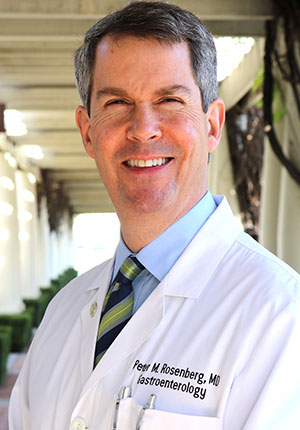
March is National Colorectal Cancer Awareness Month, and for good reason: Colorectal cancer (CRC) is the second deadliest cancer in the U.S. According to the Colorectal Cancer Alliance, every year, about 150,000 Americans are diagnosed with CRC and more than 50,000 die. Race also is a factor: CRC death rates are 35% higher for Black Americans. And a recent study from the American Cancer Society found that “the proportion of newly diagnosed individuals who were younger than 55 years has almost doubled, from 11% in 1995 to 20% in 2019.”[1]
Luckily, we can stop this disease from taking lives through early detection and prevention. Peter M. Rosenberg, MD, FACP, chief of medical staff, agrees: “Colorectal cancer is one of the most preventable and treatable types of cancer. Screening is essential to catching this disease early and saving lives.” Here are some critical steps Dr. Rosenberg recommends:
- Get screened at age 45: Screening – whether it’s an at-home, stool-based test or a colonoscopy – can detect warning signs of CRC, which can jumpstart preventative measures like removing polyps (a precursor to cancer). Screening can also detect CRC early, which increases treatment efficacy. Any positive result of a stool-based test must be followed up with a colonoscopy, which is the most sensitive test for CRC and precancerous polyps. Getting a high-quality colonoscopy is of the utmost importance. Only by meticulous examination of the colon can all precancerous lesions be detected and cancer be prevented. Patients should ask their gastroenterologist whether they track their polyp detection rate, and if so, what that rate is. If the rate is less than 25%, that may be a red flag that their colonoscopies are of lower quality.
- Know your family history: A high-risk family history for CRC is defined as either one first-degree relative (parent, child, sibling) was diagnosed with CRC or an advanced precancerous polyp before the age of 60, or more than one first-degree relative was diagnosed at any age. About 1 in 4 CRC patients have a high-risk family history. People with a high-risk family history should get screened at age 40 or 10 years before the youngest case in their immediate family, whichever is earlier.
- Eat well: A diet high in vegetables, fruits and other plant foods has been associated with decreased risk for CRC. Consumption of red meat (beef, pork, lamb) and processed meats (hot dogs, ham, bacon, sausages, cold cuts) has been associated with increased risk for CRC. Limit red meat to 18 ounces per week or less. Avoid processed meats (even low consumption increases cancer risk).
- Exercise: Physical activity (i.e., 30-60 minutes of moderate to vigorous movement per day) can reduce CRC risk by 30-40%.
- Maintain a healthy body weight: People who are overweight or obese are more likely to develop colon polyps.
- Avoid alcohol and cigarettes: According to the National Cancer Institute, people who regularly drink 3.5 drinks per day have 1.5 times the risk of developing CRC compared to nondrinkers/occasional drinkers. Long-term cigarette smoking also increases risk of CRC.
- Know the symptoms of CRC: People experiencing CRC symptoms like rectal bleeding, abdominal discomfort, unexplained weight loss, weakness/fatigue, or a change in stool or bowel habits should contact their doctor immediately.
The takeaway: CRC is preventable and easily treatable if caught early. That’s why screening is at the top of the list: It’s the No. 1 way to prevent CRC. If you are 45 years or older or have a high-risk family history, ask your doctor what screening options are best for you. Go to www.ccalliance.org for more information about CRC.
[1] https://acsjournals.onlinelibrary.wiley.com/doi/full/10.3322/caac.21772
 English
English Espanol
Espanol 简体中文
简体中文 Tagalog
Tagalog հայերեն
հայերեն 한국인
한국인 Tiếng Việt
Tiếng Việt فارسی
فارسی русский
русский 日本
日本 عربي
عربي